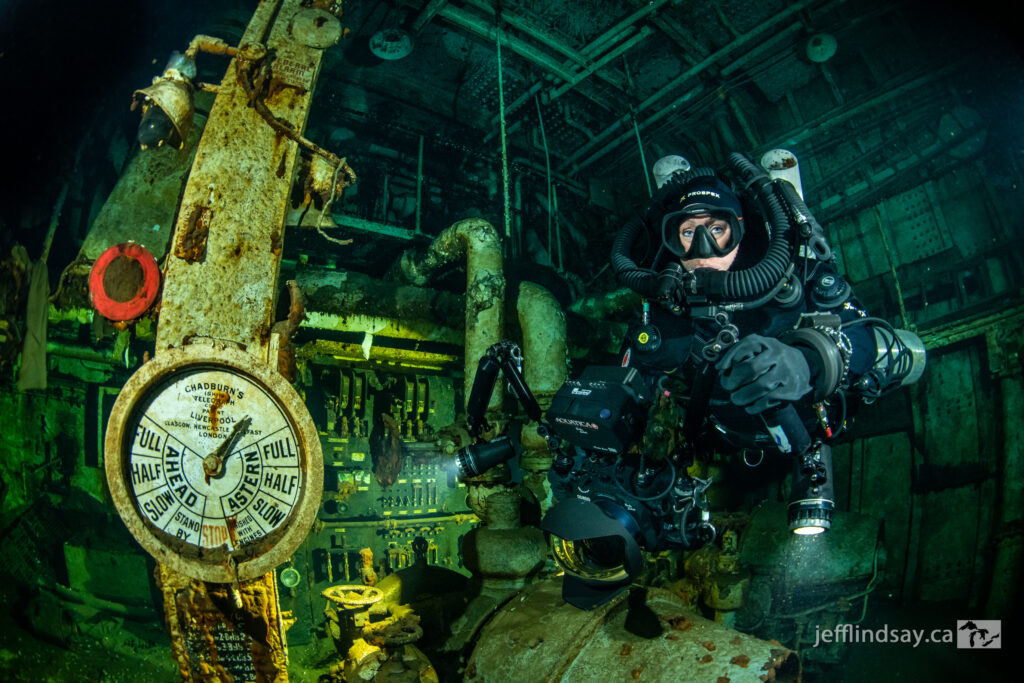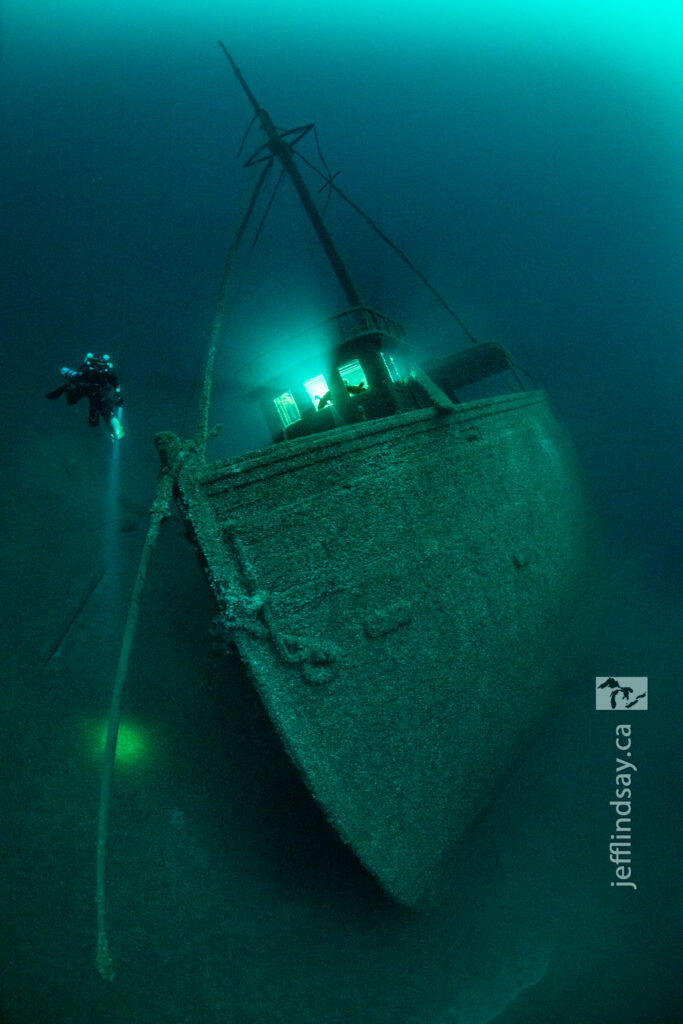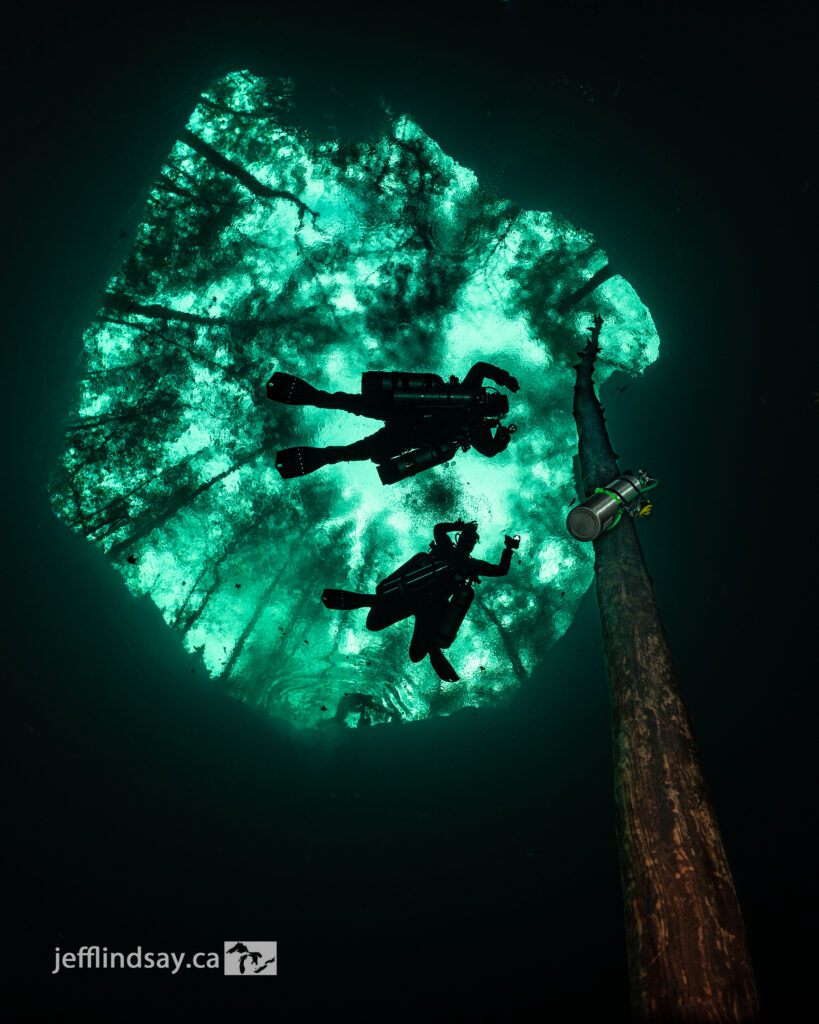
photo courtesy Jeff Lindsay
I met Jeff Lindsay while backpacking Isle Royale as he was coming ashore from diving in Lake Superior. He is a “technical diver,” meaning he dives in lakes and caves to depths up to 300 feet using a Circuit Rebreather of gasses other than air – including helium and nitrogen – that allow him to stay underwater for many hours at a time. His photographs and videos of this seldom-visited underwater world are stunning. Of course, he is highly trained and skilled for this dangerous sport, but when we talked, he mentioned circumstances which might cause him to quit a particular dive. To my surprise, much of the time it was more a feeling of distraction than anything else.
What makes this type of diving particularly dangerous, requiring such a high level of skill?
Technical diving involves breathing gasses, that while are ideal at depth, often do not support life at the surface. Choosing the right gas at the right depth is something we train and standardize. Mistakes are costly and there is usually no second chances. The diving I typically do focuses on two subsets – wreck diving and cave diving. The Great Lakes are estimated to have over 8,000 shipwrecks, many not yet located. Much of the shipwrecks I dive are located in a depths between 200 and 300 feet. Rarely visited and protected by the cold and deep freshwater, it’s common to see preserved artifacts over 100 years old and the ships looking much the same as when they sank so long ago. The water is cold at depth (35-39° Fahrenheit) and requires drysuits and heated undergarments to keep me safe and comfortable. Lengthy decompression schedules must be adhered to, which permits nitrogen to be safely exhaled from my body before returning to the surface.
Cave diving is diving underground in springs, mines and flooded caves. Often filled with some of the clearest water on earth, they are deceptively inviting. The gear and training is specialized to permit safe exploration with redundant equipment in a streamlined configuration. Special consideration regarding gas management is critical as there is no direct ascent to the surface. Depths are dictated by the cave and can range from extremely shallow to well over 300 ft. Knowing your location and way home is crucial, getting lost in a an underwater cave is usually fatal.
My personal rule is if I have three small issues before entering the water I will sit out and enjoy quiet time on the surface.
read next Quitting is Awareness

photo courtesy Jeff Lindsay
Tell me about why you might decide not to dive? Is it a gut feeling or is there something specific that has to happen?
Not diving or “calling the dive” is something that the dive community has worked to define as entirely acceptable for any reason at any time. As I’ve alluded to, this is a gear intensive sport and my memory is not perfect. Forgetting to bring a piece of gear is not common but it does happen and choosing to proceed without it may or may not be ideal. My personal rule is if I have three small issues before entering the water I will sit out and enjoy quiet time on the surface. It can be difficult to not do the dive, especially after investing so much time and money but I believe these small mistakes tell me I’m not focused and my attention is elsewhere.
I’m also a strong believer in the ‘little voice of reason’. I’ve called a dive simply by not having a good feeling. I could not point to anything specific, just a general uneasiness that I could not shake. Any “big” dive always gives me butterflies in my stomach. I equate this to heightened senses and respect for what I’m about to do. This is different feeling, something like a problem that I’m unable to properly articulate but know it exists.
I’m a strong believer in the ‘little voice of reason’. I’ve called a dive simply by not having a good feeling.
Can you give me an example?
Experience, I suppose? Being underwater when things go wrong is not a good feeling. You want to be anywhere on Earth except there. With that experience in mind, specific things that have stopped me from a dive are: gear not feeling right on my body – I know how my equipment should feel and sound; seasickness or the threat of it has kept me out of the water – as much as I want off the boat in these situations it’s not always smart; general life distractions have also stopped me – if I can’t focus completely on the task at hand, I have no business being underwater on dives that I may not have an option to surface for three hours or more.
Do you ascribe or look for meaning in event before diving, or do you just let the mistake/forgotten glove/off feeling etc. stand on its own?
Mistakes during the final checklists or forgotten equipment is a definite telltale of distraction. It’s also important to be aware of your dive partners state of mind and readiness. If they are struggling with issues it will also impact me as we are dependent on each other. I suppose I’m slightly superstitious, diving on shipwrecks where people lost their lives may have caused this. Certain shipwrecks seem to always present issues for me and I tread carefully on these dives.
read next Quitting is Optimism

photo courtesy Jeff Lindsay
How do you manage the emotions that come up when you quit a dive? Does “sunk costs” even enter your mind or is that just part of the training to be mentally tough?
Cost is certainly a concern but never a determining factor in my decision. This is an expensive sport and calling a dive will happen eventually. The important part is not to put pressure on a diver choosing to sit out. There is no dollar amount I would put on my life. Sometimes we might only get one chance in our life to dive a specific shipwreck or cave and having to ‘call it’ is a tough decision.
I find it important to have a serious reflection on my own limitations. I’ve lost several friends to this sport over the years, people that I looked up to and I considered to be the very best at what they did. Knowing that I can make mistakes and not having any illusions about my skills (or lack of) is an important part of deciding to dive or not. No matter how good we think we may be at something, the limitations of what we are capable of can change on any given day. Honest brutal truth with myself is important.
I read something recently that stated as humans we always overestimate our skills. If we see something challenging being done by someone else, even an expert, we automatically think we can do it just as well. It’s seldom the case. An anecdote about me is that years ago I had a chance to ski the women’s downhill Olympic Super G course. I think the women took 3-4 minutes to complete the course. It took me a half an hour.
I find it important to have a serious reflection on my own limitations. Honest brutal truth with myself is important.
Does any of your scuba training make its way into your everyday life?
Absolutely. I’ve seen that taking short cuts often doesn’t immediately result in severe consequences, which I think is incredibly dangerous. Eventually the short cuts become bad habits and sooner or later that deviation from a proven system that works will result in a problem. The severity of the problem is then up to luck as to when and where it happens, a less than ideal situation.
What do you do with the time instead?
Ha, good question! I usually try to fix what has broken or put in place a procedure to not make the same mistake again. If it was just a general feeling to not dive, I sit out and enjoy the sunshine on my face and remind myself that we live in truly amazing times!
This is part one in a series about intentional quitting as a force for a more positive and fulfilling life. Read more: Quitting is Optimism, Quitting is Saying Yes, Quitting is Believing in Abundance, Quitting is Awareness.


6 Responses
Another GL technical diver here, though not nearly to the level of Terry or Jeff. Have participated in other risky sports also. Absolutely agree that if things aren’t going nearly exactly to plan, it’s prudent to bail. In an activity where there is little or no room for error, conservative preplanning and quitting while you’re ahead (alive) is always the smartest play. Many of the safety and training procedures we follow in risky sports came about as a result of close calls or a death.
Hi Daniel and thanks for your comment!
I met Jeff at Todd Harbor when I was backpacking Isle Royale. I’d had a weird experience myself the week previous kayaking on Lake Superior. It is also very risky because the weather changes really fast. I was feeling hinky before we launched, plus we made several small mistakes. We turned back when we saw black clouds over Mount Josephine and the waves started to build.
I shared the story with Jeff who told me about his rule of thumb when it comes to mistakes and blurry focus. I’m so glad he – and you – are alive to have another day of diving on these extraordinary wrecks! I’ve been as far down as 100 feet at night and it is beyond trippy!
I hope we meet on the Big Lake sometime! alison
What a great article and well desereved of a good man. I have had the pleasure of diving with Jeff over the years. Such a humble and great guy. And an amazing photgrapher both above and below the surface.
thanks, Chris! I was so impressed with Jeff’s wisdom and how it relates to so many activities. And yes, his photographs are extraordinary. Feel free to share with your friends 🙂 alison
Great article Alison. I do a lot of diving with Jeff and you captured the “little voice” scenario very well. A nice read.
thank you so much, Terry! I have tremendous respect for what you do. I am a recreational diver and find the underwater world incredible, another planet, so much life. One of my most memorable dives was at night near a wreck in the Caribbean. I watched a lobster bolting away from an octopus. So lucky to be witness. I love digging into to the crossover of other sports in how we think about risks and those gut feelings mean to us. Glad you enjoyed the interview! Please share with your dive friends 🙂 alison